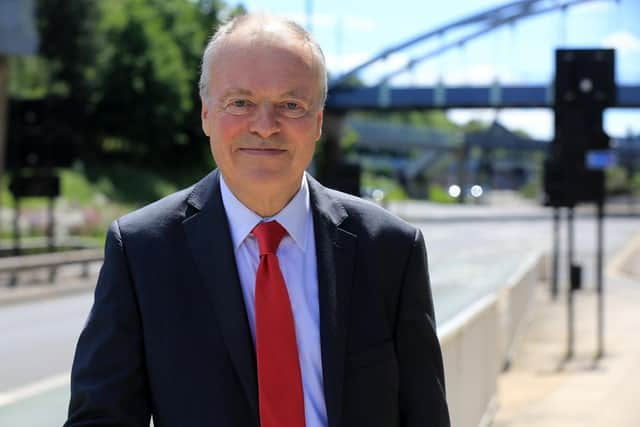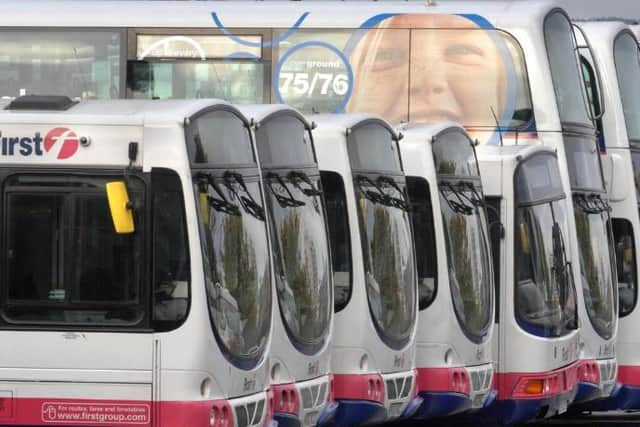Sheffield’s bus service ‘isn’t fit for purpose’ - major review finds
and live on Freeview channel 276
These are the findings of The Independent Bus Review released today which gives a detailed account of the South Yorkshire Bus service.
It highlights the failings of the current system with reliability and frequency being top priorities.
Advertisement
Hide AdAdvertisement
Hide AdClive Betts, MP for Sheffield South East, chaired the review he said the service has changed beyond recognition by the coronavirus pandemic but now that the country is on its way to recovery a huge change is needed.


He added: “The bus service is not currently fit for purpose. Buses do not arrive on time, the ticket system is overly complicated and people often have to take more than one bus to their destination.
“I see public transport as a crisis and it's deteriorating but we can have a better brighter service.”
The review ends with a step by step plan for the future - taking into consideration the experiences and feedback from 5,900 members of the public, bus users, community groups and businesses.
Advertisement
Hide AdAdvertisement
Hide AdIt focuses on frequency and reliability and public transport relation to climate change.


Due to coronavirus many people have been working from home or have been furloughed which has also changed transport patterns.
With a lack of people taking the bus comes a lack of revenue and the report states that there has been a £10 million Government bailout in the Sheffield City Region alone.
The evidence provided by South Yorkshire Passenger Transport Executive shows that funding for bus services has declined by 40 per cent over the last decade.
Advertisement
Hide AdAdvertisement
Hide AdThe review recommended that a simpler ticketing system and innovative fare structures should be looked into.
The report highlights customer dissatisfaction with the bus service with over 60 per cent of respondents saying they were either dissatisfied or very dissatisfied with bus reliability across the region which includes Sheffield, Doncaster, Rotherham, and Barnsley.
Other causes of dissatisfaction listed in the review include bus frequency, ticket complexity and congestion.
“There is no overall system between the buses, trams, and trains which leaves customers having to pay separate fares with different companies,” Mr Betts added.
Advertisement
Hide AdAdvertisement
Hide Ad“We need to put money into it and properly spend that money.
“At the moment companies can decide if a bus route is profitable or not and reduce the service or even withdraw it.
“We’ve heard some really troubling stories where this has happened and it takes people three or four times longer to get where they were going.”
A petition group based in Chapeltown told the review that the direct service from Chapeltown to Meadowhall had been withdrawn meaning the journey now required passengers to get two buses – the second of which was every 30 minutes.
Advertisement
Hide AdAdvertisement
Hide AdDespite the flaws found in the bus service, the report states how vital public transport is for the region, especially for those on low-incomes or in rural areas.
Mr Betts said: “People rely on buses to get to work and to see their family.
“It’s often those on low incomes and young people who use the bus regularly.
“We need to make sure there is a comprehensive bus service to join up all communities.”
Advertisement
Hide AdAdvertisement
Hide AdClimate change is another significant section of the report with a push to move buses into being fueled by electric or hydrogen.
The report, launched by Sheffield City Region, stated that only 30 per cent of the bus fleet in South Yorkshire is currently Euro six compliant - which highlights harmful exhaust emissions - and there are only 36 electric buses in operation in the region – all based in Sheffield.
Mr Betts said: “Buses should be an important asset to the city with climate change and pollution being increased by road traffic.
“If we want Sheffield to truly be a great city to live in we need to tackle climate change and that won't happen if the bus system remains the way that it currently is.
Advertisement
Hide AdAdvertisement
Hide Ad“We need people to want to take the bus rather than their cars but that won't happen until the service is more attractive to potential bus riders.
“Buses also need to be cleaner, running on hydrogen.”
The report sets out a plan of action and within the first three months of the report being released the commissioners recommend bus travel be made more attractive for young people and the disabled.
It also recommends an appointment of a regional leader to oversee all new changes, an advocate who will lobby for additional funding.
This role has been carried out by metro mayors in other parts of the country.
Advertisement
Hide AdAdvertisement
Hide AdOther recommendations include better access for disabled passengers, a lower fare for apprentices and simplification of the fare system.
“London has a great public transport system and a lot of taxpayers money goes into it," said Mr Betts.
“I think it's reasonable that money should be shared into South Yorkshire as our transport system needs it just as much.
“I think we have built up a case to make some serious change to the current system.”
Advertisement
Hide AdAdvertisement
Hide AdThe 'medium stage' of recommendations focuses on changes to be made three years after the publication of the bus review.
It explores the possibility of franchising but recognises that this is not a quick system to establish in a city.
Clive said: “This will be an ongoing discussion.
“We have already agreed to have a review in a few months' time but we need to start the job today.”
“Buses should be the backbone of a public transport system, yet in South Yorkshire buses have been allowed to decline and passengers have been the ones to suffer. This cannot continue."
TABLE FOR HUB
Immediate recommendations (three months) include:
Advertisement
Hide AdAdvertisement
Hide AdCreation of a clear universal offer for disabled passengers and an enhancement of concessionary offers for apprentices (regardless of age).
Extending the English National Concessionary Travel Scheme to allow elderly passengers to use travel passes until the final bus service of the night.
Appoint a regional leader who can promote buses and maintain their importance on regional political agendas.
Procure the necessary expertise to financially and legally investigate the process of franchising.
Advertisement
Hide AdAdvertisement
Hide AdProcure independent expertise and capacity to facilitate and coordinate the transition of existing voluntary partnerships (bus partnership) to a new South Yorkshire-wide Enhanced Partnership.
Short-term recommendations (six to 12 months) include:
A pause on all tendered and commercial service reductions until December 2021.
Co-development of a public transport implementation plan.
SYPTE ceases to exist as a separate organisation and is merged with the Sheffield City Region Executive team with direct accountability to the Sheffield City Region Mayoral Combined Authority.
That the system for tendering social necessary services is reformed.
Advertisement
Hide AdAdvertisement
Hide AdThat a ring-fenced portion of the £30m a year devolution deal funding is used for improvements to the bus system – prioritising interventions to tackle congestion.
Medium term recommendations (three years) include:
That the Enhanced Partnership is fully implemented and an assessment of whether it delivered necessary benefits is made, before franchising is pursued and this decision is made no later than three years after publication of the report.
Integrated a bus policy into policy areas such as planning, housing and transport.
Long-term recommendations (more than five years) include:
Exploration of a municipal ownership of a bus company potentially as an arm’s length organisation from the Mayoral Combined Authority.
An increased and longer-term role of buses in tackling climate change.